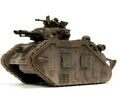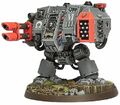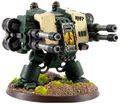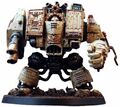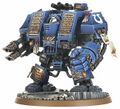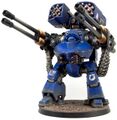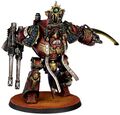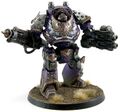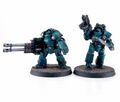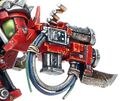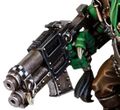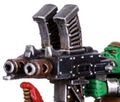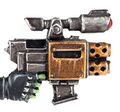Twin-Linked

Twin-Linked weapons are a subtype of weapon found in the Warhammer 40,000 universe that embody the timeless tactic in warfare of ensuring a hit by slinging more rounds at the target. The way this is done is typically duct taping two guns together and firing them at once so that the target has to avoid twice the number of rounds. Typically vehicles, monstrous creatures and terminators carry twin-linked weapons, considering that typically only heavy weapons are twin-linked. Although storm bolters are twin-linked boltguns in appearance, they actually increase the fire rate of the weapon. Perhaps a prerequisite of being allowed to wear Terminator armor is knowing where those extra shots go.
Where exactly the other gun's shots go if you hit the first time is a mystery whose answers are known to none, but it means that twin-linked weapons are, somewhat ironically, horribly inaccurate as at least one of the guns is always guaranteed to miss the enemy. As of 8th Edition, this is now no longer an issue, see below.
For the most part, twin-linked weapons are more often found to be mounted on vehicles, turrets, batteries, specific emplacements and etc. for a variety of reasons. From the fact that they can afford to have that much dakka, they might actually need that much dakka, and being mounted on a vehicle or some static weapon emplacement means that recoil or weight isn't much of an issue (depending on the weapon of course).
In Game Terms[edit]
When trying to hit a target, you can reroll if you miss. This is useful especially if you are using a weapon that has a good chance of melting your face off rather than firing, as it means that if you get a Gets Hot! result you can reroll, though template Gets Hot! weapons roll for it before resolving scatter, so don't put too much faith in plasma cannons. Weapons that scatter reroll an undesirable result if they are twin-linked as well. This can be exploited to allow you to reroll ordnance (for example, coupling a Triarch Stalker with a Doomsday Ark).
This, however, resulted in a rather odd display of mechanics over common sense: if you hit with your first shot, rolling the second bullet would cause it to just disappear into the warp itself. This made twinlinking always flatly worse than just having a second shot: Two of the same gun have the same odds to get at least one shot, but the two guns have a chance to score a hit and wound with the second shot.
8th edition[edit]
Twin-linked no longer gives you a reroll - in an incredible display of common sense, our overlords have decided that a twin-linked autocannon is simply two autocannons duct taped together, and twin-linked weapons now give you twice as many shots as a non twin-linked weapon.
Aside from the logical improvement to its advantages, since the additional shots now actually go somewhere (they can all hit the target), it also logically makes twin-linked plasma weapons more likely to melt your own face, instead of less likely. Which really does make sense.
10th edition[edit]
...and now we're back to them simply granting a re-roll to hit, while good for mechanics (as GW had issues balancing the 8th and 9th edition style), it once again makes them the most inaccurate weapons in the game. Plus a number of the new Marine guns previewed still get the two shots, most notably the Land Raider's Twin-Linked Lascannons.
Why GW doesn't just take AoS' notes for once and have twin-linked weapons proc an additional hit on a natural 6 eludes even /tg/'s greatest minds.
In Real Life[edit]
Functionally in reality, twin linked weapons are most often seen in modern warfare in situations where you or the target are moving very fast and you need to increase your odds of hitting by shooting more bullets. This is why pretty much all small caliber AA weapons tend to be mounted in pairs such as the M45 Quadmount, quite literally two pairs of twin-linked Browning Machine Guns that were twin-linked in turn, or the German Wirbelwind AA tank, or the 4 twin linked 50 calibers on the P-47 for eight total. In ground combat twin-linking is rarer but not unheard of, the SAS jeeps used by long range desert patrols were sometimes armed with twin-linked Lewis guns. Vickers 'K' guns.
The more common use in the past was for single shot weapons in which case reloading would take so long that being able to get a second shot off quickly was more important, cost be damned. This is why many old time 'elephant guns' have two barrels. If the elephant or even a boar turns on you if your first shot does not kill it you better pray you can get a follow up shot to connect. Over-under shotguns (breech loading double shot shotguns) for hunting are another example: getting a second shot off immediately matters in case your target escapes you, be it a deer or especially a bird.
Muskets can count too, as some variants were built custom by gunsmiths to fire both musketballs at the same time, though these would tend to fetch a higher price than just a good old normal musket, and as such were usually reserved to men of great wealth or standing within either the merchant classes or the nobility, the nobility being the more likely of the two.
In Other Words...[edit]
Gallery[edit]
Imperium[edit]
-
Close-up of the Krieg Heavy Weapons Squad's Heavy Stubber. -
The Sabre Gun Platform, when you think one pair of Heavy Stubbers isn't enough dakka -
A Tigrus Combi-Bolter (Although you can't really tell at this view) -
Leman Russ Exterminator -
Leman Russ Annihilator -
-
-
-
Hellfire Dreadnought with Twin-linked LasCannons -
Mortis Dreadnought with two pairs of Autocannons for massive dakka -
Deathwing Dreadnought -
Venerable Dread with a pair of LasCannons -
Deredeo Dread, even more dakka than the Mortis -
Contemptor-Osiron Dread with twin-linked Autocannons -
Contemptor-Cortus Dread with twin-linked Heavy Bolters -
Two marines in Tartaros Terminator Armor;one carrying a Combi-Bolter the other a Reaper Autocannon
Orks[edit]
-
MegaNob Twin-linked Shoota -
Front View -
Back View -
Common Twin-linked Shoota -
Twin-linked Shoota mounted on a Wartrakk




